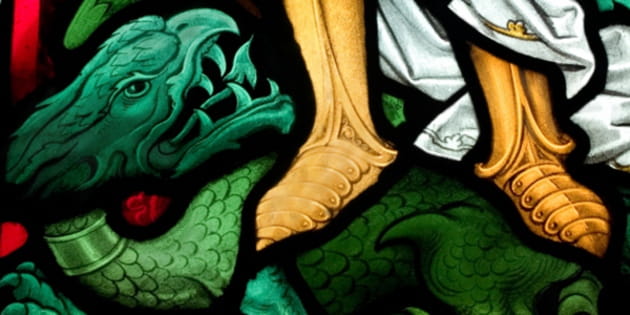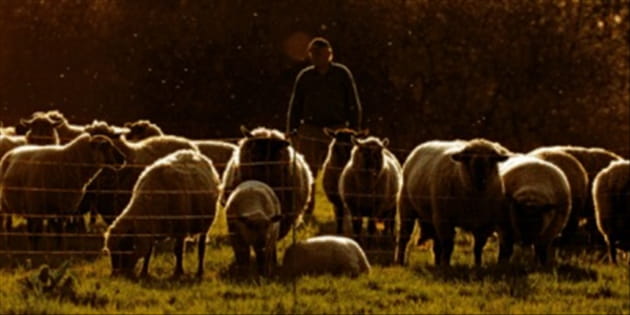Another Christmas season has come and gone. The last remaining decorations have been packed away for
next year. Many people heard the wonderful story of Christ’s incarnation, and some understood it for the very first time. But the version of the Christmas story that most haven’t heard, the one that even many
Christians don’t seem to understand is the one found in Revelation 12.
It is this account that guards Matthew’s and Luke’s from the dangers of sentimentality. It keeps our vision of the incarnation from getting dislodged from the broader drama of redemption. And it reminds us that Christ’s Advent to earth was nothing less than a strategic, decisive military move in the raging cosmic battle between darkness and light. This is the full-orbed Christmas story that we need reminding of all year round.
Let’s look at this passage, think about the cast of characters, and then ponder three important lessons for today.
And a great sign appeared in heaven: a woman clothed with the sun, with the moon under her feet, and on her head a crown of twelve stars. 2 She was pregnant and was crying out in birth pains and the agony of giving birth. 3 And another sign appeared in heaven: behold, a great red dragon, with seven heads and ten horns, and on his heads seven diadems. 4 His tail swept down a third of the stars of heaven and cast them to the earth. And the dragon stood before the woman who was about to give birth, so that when she bore her child he might devour it. 5 She gave birth to a male child, one who is to rule all the nations with a rod of iron, but her child was caught up to God and to his throne, 6 and the woman fled into the wilderness, where she has a place prepared by God, in which she is to be nourished for 1,260 days.
7 Now war arose in heaven, Michael and his angels fighting against the dragon. And the dragon and his angels fought back, 8 but he was defeated, and there was no longer any place for them in heaven. 9 And the great dragon was thrown down, that ancient serpent, who is called the devil and Satan, the deceiver of the whole world—he was thrown down to the earth, and his angels were thrown down with him. 10 And I heard a loud voice in heaven, saying, “Now the salvation and the power and the kingdom of our God and the authority of his Christ have come, for the accuser of our brothers has been thrown down, who accuses them day and night before our God. 11 And they have conquered him by the blood of the Lamb and by the word of their testimony, for they loved not their lives even unto death. 12 Therefore, rejoice, O heavens and you who dwell in them! But woe to you, O earth and sea, for the devil has come down to you in great wrath, because he knows that his time is short!”
13 And when the dragon saw that he had been thrown down to the earth, he pursued the woman who had given birth to the male child. 14 But the woman was given the two wings of the great eagle so that she might fly from the serpent into the wilderness, to the place where she is to be nourished for a time, and times, and half a time. 15 The serpent poured water like a river out of his mouth after the woman, to sweep her away with a flood. 16 But the earth came to the help of the woman, and the earth opened its mouth and swallowed the river that the dragon had poured from his mouth. 17 Then the dragon became furious with the woman and went off to make war on the rest of her offspring, on those who keep the commandments of God and hold to the testimony of Jesus. And he stood on the sand of the sea. (Revelation 12:1-17)
There are three main characters in this passage: the woman, the dragon, and the child.
Another Christmas season has come and gone. The last remaining decorations have been packed away for
next year. Many people heard the wonderful story of Christ’s incarnation, and some understood it for the very first time. But the version of the Christmas story that most haven’t heard, the one that even many
Christians don’t seem to understand is the one found in Revelation 12.
It is this account that guards Matthew’s and Luke’s from the dangers of sentimentality. It keeps our vision of the incarnation from getting dislodged from the broader drama of redemption. And it reminds us that Christ’s Advent to earth was nothing less than a strategic, decisive military move in the raging cosmic battle between darkness and light. This is the full-orbed Christmas story that we need reminding of all year round.
Let’s look at this passage, think about the cast of characters, and then ponder three important lessons for today.
And a great sign appeared in heaven: a woman clothed with the sun, with the moon under her feet, and on her head a crown of twelve stars. 2 She was pregnant and was crying out in birth pains and the agony of giving birth. 3 And another sign appeared in heaven: behold, a great red dragon, with seven heads and ten horns, and on his heads seven diadems. 4 His tail swept down a third of the stars of heaven and cast them to the earth. And the dragon stood before the woman who was about to give birth, so that when she bore her child he might devour it. 5 She gave birth to a male child, one who is to rule all the nations with a rod of iron, but her child was caught up to God and to his throne, 6 and the woman fled into the wilderness, where she has a place prepared by God, in which she is to be nourished for 1,260 days.
7 Now war arose in heaven, Michael and his angels fighting against the dragon. And the dragon and his angels fought back, 8 but he was defeated, and there was no longer any place for them in heaven. 9 And the great dragon was thrown down, that ancient serpent, who is called the devil and Satan, the deceiver of the whole world—he was thrown down to the earth, and his angels were thrown down with him. 10 And I heard a loud voice in heaven, saying, “Now the salvation and the power and the kingdom of our God and the authority of his Christ have come, for the accuser of our brothers has been thrown down, who accuses them day and night before our God. 11 And they have conquered him by the blood of the Lamb and by the word of their testimony, for they loved not their lives even unto death. 12 Therefore, rejoice, O heavens and you who dwell in them! But woe to you, O earth and sea, for the devil has come down to you in great wrath, because he knows that his time is short!”
13 And when the dragon saw that he had been thrown down to the earth, he pursued the woman who had given birth to the male child. 14 But the woman was given the two wings of the great eagle so that she might fly from the serpent into the wilderness, to the place where she is to be nourished for a time, and times, and half a time. 15 The serpent poured water like a river out of his mouth after the woman, to sweep her away with a flood. 16 But the earth came to the help of the woman, and the earth opened its mouth and swallowed the river that the dragon had poured from his mouth. 17 Then the dragon became furious with the woman and went off to make war on the rest of her offspring, on those who keep the commandments of God and hold to the testimony of Jesus. And he stood on the sand of the sea. (Revelation 12:1-17)
There are three main characters in this passage: the woman, the dragon, and the child.
The
woman (described in vv. 1-2) is clothed with the sun, with the moon is beneath her feet, and seven stars crowning her head. Who is she? Probably not Mary, but Israel. Verse 2 has clear echoes of Genesis 37, the passage about Joseph’s dream where the twelve stars represented the twelve sons of Jacob. John seems to be identifying this woman with Israel, God’s covenant people. The woman’s pregnancy and agonizing birth pangs point to the sufferings of God’s people as they awaited the Messiah, but also deeply resonated with the suffering saints who originally read Revelation.
Verse 3 introduces another character, a “
great red dragon” possessed of both worldly power (all those heads and crowns!) and deep, unrelenting hatred and hostility towards the woman and her child. If it wasn’t already clear, verse 9 removes all doubt: the dragon is “the ancient serpent” the devil himself, “Satan, the deceiver of the whole world.” This not only identifies him with the serpent in Genesis 3, but also shows his antagonism towards God’s people, and especially towards the child of the woman, whom he seeks to devour.
And who might this
child be? Read verse 5 again:
“She gave birth to a male child, one who is to rule all the nations with a rod of iron, but her child was caught up to God and to his throne.” This, of course, is Jesus the Messiah.
So what’s going on here? This passage uses heavily symbolic language to describe Satan’s attempts to destroy the Christ. Remember the massacre in Bethlehem? Remember the forty days in the wilderness? Remember the crucifixion?
But John is sounding another note as well. He says that this child rules the nations with a rod of iron (quoting Psalm 2) and is snatched up to God and his throne. Far from being destroyed by the dragon, this child shares the throne of God! This child is none other than Jesus the Christ (v. 10), the crucified Lamb (v. 11), the resurrected, exalted, and enthroned King.
But what does it all mean? Revelation is notoriously difficult to understand – so weird, in fact, that most of us just avoid it altogether. And yet, it is still God’s word for the church. And though interpreters may disagree on some of the details, the main point is clear and contains three very important lessons for us.
1. First, this passage points us to the defeat of evil in the incarnation, suffering, and resurrection of Jesus Christ. Though the passage begins with a war in heaven (v. 4a, expanded in vv. 7-9), the dragon is defeated and thrown down! The details of the passage hint first at the primordial defeat of Satan, when he was first thrown out of heaven (vv. 7-9). Then verses 10-11 proclaim his decisive defeat, as a loud voice proclaims:
Now the salvation and the power and the kingdom of our God and the authority of his Christ have come, for the accuser of our brothers has been thrown down, who accuses them day and night before our God. 11 And they have conquered him by the blood of the Lamb and by the word of their testimony, for they loved not their lives even unto death.
Satan is conquered, vanquished, defeated! How? By the blood of the Lamb! This points us to the cross. That’s where the decisive victory was won, and because Christ conquered Satan there, the “devil knows his time is short” (v. 12). He’s like a feisty snake pinned to the ground by a huge boulder, waiting for the sharp blade of a hoe to finally take his head off once and for all. Yes, his bite is still poisonous – but his power is limited and will soon come to an end.
And that means that evil can be defeated right here and right now, in your heart and mine, today. Wesley understood this well, writing,
Come, Desire of nations, come,
Fix in us Thy humble home;
Rise, the woman’s conqu’ring Seed,
Bruise in us the serpent’s head.
2. This passage also shows us how God preserves the church through suffering. This story, written to the suffering church (remember, Christians were still being fed to the lions in those days), is all about the suffering church at the hands of Satan. In keeping with his war against heaven, and his hostility towards Jesus at his birth, Satan is depicted as the serpentine dragon who continues to pursue and persecute the people of God. You can see this as he chases her into the wilderness in verse 14, tries to carry her away with a flood in verse 15, and unleashes his fury against the woman and her offspring in verse 17.
But through it all, God preserves his people! Though the woman is chased into the wilderness, God has prepared a place for her and she is actually “nourished.” He gives her “eagle’s wings,” almost definitely a reference to the original exodus, when God rescued his suffering people from Egypt (see Ex. 19:4; Deut. 32:11).
But God not only rescues and nourishes his people; he also puts a limit on their suffering, which is probably the point of the 1,260 days. I know some think this is a literal 3 ½ years of tribulation. Maybe, maybe not. But either way, don’t let that distract you from the main point. This number, whatever else it may mean, shows us that the suffering of the church is temporary, short, and limited.
3. Finally, this passage shows us how to communicate the gospel to our world. I don’t mean that we need to speak about a red dragon and a conquering child (though, that’s not a bad idea!). So, what do I mean?
Well, biblical scholars point out that John was using symbolism and imagery that was very well known in the ancient world. People were very familiar with pagan stories about the conflict between a dragon and a child. What seems strange to us was as embedded in their cultural folklore as the stories of
Jack and the Beanstalk or Tolkien’s
Hobbit and
Lord of the Rings are in ours. But John was investing this mythology with new meaning and significance.
[1]
This is what C. S. Lewis meant when he talked about myth becoming fact. This is part of our job. We’ve got to learn how to take the mythologies and stories of our culture and show people that it is only in Jesus that we see the ultimate fulfillment of the deep hopes and yearnings that lurk beneath our greatest myths and stories. Wesley, once again, got it right in one of his Advent hymns:
Israel's strength and consolation,
hope of all the earth thou art;
dear desire of every nation,
joy of every longing heart.
[1] Grant Osborne says, “The purpose of this is evangelistic, to say that what the Greeks have known only as myth has now been actualized in history…What the pagans longed for in their myths has now become true in Jesus. Therefore, the form is both deliberate and brilliant, using what in our time has been called a ‘redemptive analogy’ to present the gospel in such a way as the capture the interest and hearts of the non-Christian reader.” Grant Osborne,
Revelation: Baker Exegetical Commentary on the New Testament (Grand Rapids: Baker, 2002) p. 454.
Brian G. Hedges is the lead pastor for Fulkerson Park Baptist Church in Niles, Michigan. Brian has been married to Holly since 1996 and they have four children. He is the author of Christ Formed in You: The Power of the Gospel for Personal Change (Shepherd Press, 2010). And Licensed to Kill: A Field Manual for Mortifying Sin (Cruciform Press, 2011).
Brian blogs at Light and Heat. Follow him on Twitter @brianghedges
http://www.christianity.com/god/jesus-christ/the-woman-the-dragon-and-the-child.html














